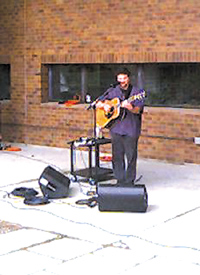“I am not an Animal”
April 24, 2002
“I am not an animal.” These are the words spoken by Francis Bok on April 22, to a small section of students in Professor Janet Farrell Smith’s Morals and Law class. These were the same words that he spoke to his master and captor at the age of 14 as a member of the Dinka tribe and former slave in South Sudan. Bok told his story before a crowd of silent, rapt listeners.
Seven years old and finally allowed to go to the market with the older boys, his mother sent him out one morning to sell beans and eggs. However, a few minutes after he arrived, he heard people talking of a nearby village being burned and soldiers raiding the area. People were starting to leave the market, fearing for their lives, yet he and his companions stayed on, not heeding any warning or paying any attention.
Bok and the other sellers had not long to wait before the militiamen and cavalry showed up at the market, firing upon the crowd. “They didn’t have a chance,” he remarked. He ran to escape and was quickly grabbed by a horseman and placed under guard with the other children waiting to join what would turn out to be a long march to Sudan’s capital city, Khartoum.
He was sold to a wealthy Muslim family and put to work in the fields, raising and tending the goats, in spite of his extreme youth. However, the ordeal did not end with slavery alone. Bok endured beatings and insults in which he was called abid, a derogatory term meaning “black slave.” His first introduction into the family began with beatings administered to him by the children, ordered by the master to show him his place.
Bok once dared to ask his master, “Why do you call me abid? Why do I sleep with animals?” His master didn’t answer the question until he’d handed Bok another dose of brutality. He replied later on saying, ” ‘You sleep with the animals because you are an animal.’ ” He escaped for the first time when he was 14. “In my heart, I wanted to go away. I wanted to be free. I’d rather die than be a slave.”
He was captured and brought back a few days later, before escaping again, this time under the threat of death. Bok made it to Khartoum, finding safety in a refugee camp. From there, Bok received a visa from the Egyptian consulate through the black market and ended up making his way to America eventually.
For the last two years, he has worked in America and attended school. Bok started speaking of his experiences a year after he came to the U.S., lecturing at schools and before Congress. He has spoken to former Secretary of State, Madeleine Albright, entreating her to address the terrible situation.
Bok was reluctant to speak at first, wanting to finish school. It was through the intervention of Charles Jacobs, president of the American Anti-Slavery Group and finally relented and first made the trip to the headquarters in downtown Boston in May of 2000. He has been here ever since. He attends classes at the Boston Evening Academy but life in America has brought some difficulties.
Since he has had no formalized schooling and, at 21, he is the oldest student in a school of adolescents, he has found himself mocked by his fellow students for being unable to read or write. Yet, he bears no ill will towards his classmates, citing the fact that they are unaware of his story. This makes Bok’s desire to inform the world around him of the South Sudanese atrocities that much more pressing.
The situation in Sudan is fraught with chaos. In the North, the population is mostly Arab Muslims while the South is filled with Christian and animist Africans. Civil war has been ongoing, with famine, slavery, and genocide as an outgrowth of this religious and cultural conflict.
One of Bok’s fondest desires has been to see his family. In 1996, he sent a letter to his parents but never heard back. Recently, he found out that his parents and two sisters were killed the day he was taken from the marketplace. He had a brother alive who is now serving in the Sundanese People’s Liberation Army.
When asked if he would ever go back to visit, Bok said no. He has received a great deal of e-mail and threats from Muslims within Khartoum who claim that he is telling lies and he has come to the attention of the Sudanese government. Yet, this will not stop him. “What good is my freedom if my people are all dying?”
Francis Bok has a book coming out between June and August of 2002. To search for it, look it up under his name at Amazon.com, as the title has not been decided upon. For more information about the American Anti-Slavery Group, visit www.iabolish.com.





















































